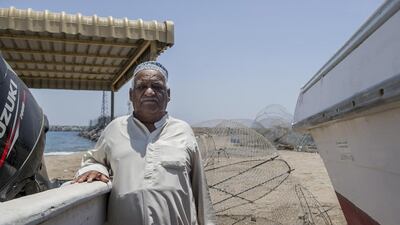FUJAIRAH// Tales of sea wonders, abandoned ships and remote islands were the only source of entertainment after an iftar meal decades ago, says Ali Al Samahi.
The Emirati fisherman, 75, used to sit in the majlis after iftar with his friends, family and neighbours and listen to the stories of the older fishermen.
Most of the tales were made up but they were riveting to listen to, says Mr Al Samahi.
“It was like watching the television nowadays. Each day they used to tell us new stories and sometimes one of them repeats the same story but with different events,” he says of the 1940s and 1950s.
“We knew that most of the stories were unreal, yet we still enjoyed it a lot.
One such story was about catching a huge fish that no one had seen before and having to return it to the water because they could not bring it to the shore because of its size.
“There was another story about how one fisherman found a remote island with unique fruit and landscape, but he couldn’t get any closer because it was guarded by a haunted abandoned ship,” says Mr Al Samahi.
“When I remember those stories now I laugh at myself, as we used to dream about them. But they gave us something to look forward to, helped us to expand our imagination and love what we do as fishermen.”
To Mr Al Samahi, Ramadan brings people closer to God and to each other.
“We used to share the iftar meal with our neighbours as we gathered every day and shared food, prayers and talk – all six families of the neighbourhood,” says the father of eight and grandfather of 15.
“We had strong ties with everyone but, unfortunately, nothing stays the same.”
He laments that online communication has replaced face-to-face dialogue while television has supplanted imaginary tales.
“Still, we gather as family members around the table for iftar, but only for a few minutes before they all get busy with their own lives,” says Mr Al Samahi.
Today, he still works as a fisherman and owns two boats.
“In the past, we used to break our fast after sunset with dates and water until we reached our homes and ate together,” says Mr Al Samahi.
“The weather and lack of air conditioning used to make our fasting difficult. But nowadays, air conditioning is a blessing that the youth should appreciate like we do.
“Now during Ramadan, we start fishing after sunrise and, depending on the catch, either we stay till 11pm or until sunset. If we do stay till sunset, I order food and have iftar with the rest of the workers.
“Ramadan is not only about fasting, it’s about worshipping, bonding and sharing. It’s my favourite time of the year.”
rhaza@thenational.ae

